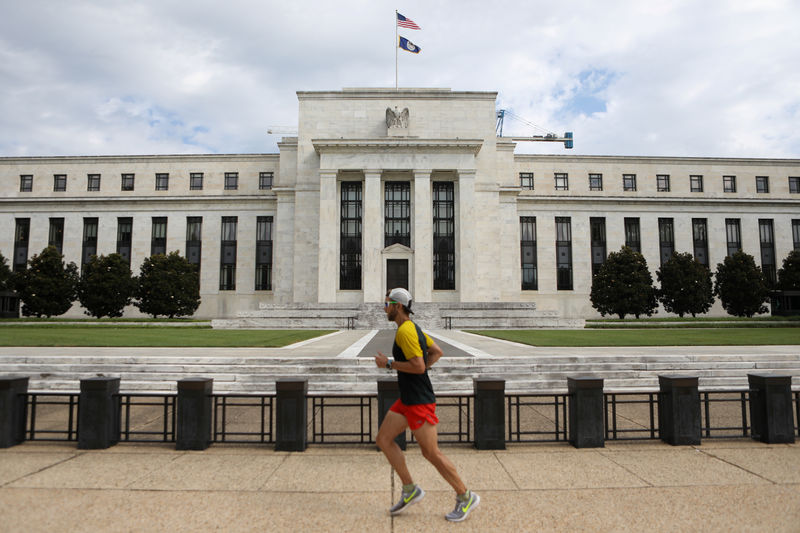By Yasin Ebrahim
Investing.com – Federal Reserve policymakers generally agreed that the threshold to begin scaling back its monthly bond purchases had not yet been met, though some members believe the conditions to taper could arrive sooner rather than later amid an improving economic backdrop, according to the minutes of the Federal Reserve's June meeting.
"The Committee's standard of 'substantial further progress' was generally seen as not having yet been met, though participants expected progress to continue," the minutes showed. There were, however, various participants that expected the conditions for the taper threshold to be "met somewhat earlier than they had anticipated at previous meetings in light of incoming data."
At the conclusion of its previous meeting on June. 16, the Federal Open Market Committee kept its benchmark rate in a range of 0% to 0.25% and the pace of bond purchases at $120 billion monthly.
While the unchanged monetary policy was widely expected, the central bank brought forward its projections for when the liftoff in rates will get underway. It hinted at two rate hikes in 2023, and signaled higher odds for a first hike coming as early as 2022.
The somewhat hawkish tilt caught many by surprise, and brightened the spotlight on tapering. Fed chairman Jerome Powell confirmed that the topic of tapering had been broached at the June meeting, dubbing it the "talking-about-talking-about meeting."
The central bank, however, appears in no rush to begin tapering as some participants preferred that the committee wait for further information in the coming months to "make a better assessment of the path of the labor market and inflation," according to the minutes.
Under its current asset purchase program, the Fed is buying $40 billion in mortgage backed securities, or housing debt, and $80 billion a month in Treasuries.
Differences over whether to lean more heavily toward tapering MBS purchases or Treasuries, or both simultaneously, was also a hot topic of debate. Those in favor of trimming MBS purchases more quickly or earlier Treasuries, pointed to the need to cool the housing market amid concerns over valuations. While several other participants preferred to reduce the pace of Treasury and MBS purchases commensurately because this approach would be "well aligned with the committee's previous communications or because purchases of Treasury securities and MBS both provide accommodation through their influence on broader financial conditions."
The recovery in the labor market appears to be the heart of the Fed's taper threshold, with Powell waxing lyrically about the prospect of further job gains to come later this year, forecasting that the current labor supply issues are likely to wane.
"I think it's clear, and I am confident, that we are on a path to a very strong labor market," Powell said in the post-Fed meeting press conference on June 16. "I would expect that we would see strong job creation building up over the summer and going into the fall."
The pace of inflation, meanwhile, raised a few eyebrows at the committee, though members continue to believe the factors driving inflation are transitory.
"[P]articipants remarked that the actual rise in inflation was larger than anticipated, with the 12-month change in the PCE price index reaching 3.6 percent in April. Participants attributed the upside surprise to more widespread supply constraints in product and labor markets than they had anticipated and to a larger-than-expected surge in consumer demand as the economy reopened," the minutes showed.
While the minutes didn't offer a clearer picture on the timing of tapering, some on Wall Street believe the monetary policy pendulum has swung toward the Fed tightening sooner rather than later.
"We expect it [Fed] to provide forward guidance in September and announce tapering at the end of 1Q22, one quarter later than consensus," Morgan Stanley (NYSE:MS) said. "There are inherent uncertainty bands around this view and given the speed of the labor market recovery I would place the risk of a sooner than later start to tapering," Morgan Stanley Economist Ellen Zentner said in a note.
